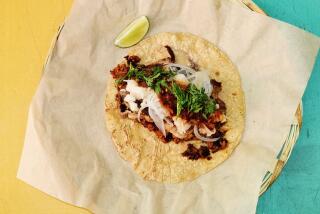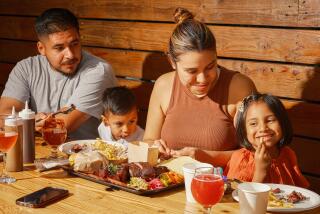If you think Mexican food is unhealthy, then you need to read this cookbook
Living in Los Angeles means having to keep up with all the diets: Atkins diet, the Whole 30, the Paleo diet. Thereās no shortage of advice on what you should be eating.
Now thereās finally a cookbook for the politically aware Chicano activist. āDecolonize Your Dietā serves up Mexican food recipes with a side order of history.
The bookās biggest beef? Thereās a misconception that traditional Mexican food is unhealthy, according to its authors, Luz Calvo and CatriĆ³na Rueda Esquibel, spouses and professors, Calvo at Cal State East Bay and Rueda Esquibel at San Francisco State University. A large emphasis on meats and the use of cheese came after colonization, the authors argue. When corn was abandoned for flour, the tortilla was never quite the same.
The plant-based recipes favor ingredients that their Mexican ancestors would have recognized as food. Beans, nopales (cactus), verdolaga (purslane), quelites (lambās-quarters) all find a place on the more political plate. Even some old-time favorite recipes get an update, including aguas frescas (fruit drink). Goodbye, sugar, hello, locally sourced honey.
Instead of a late-night run to your favorite taco truck, āDecolonize Your Dietā hopes to inspire readers to come back in the kitchen and cook a pot of beans. Just as their ancestors intended.
We asked Calvo to discuss the cookbook and the future of traditional Mexican cuisine:
What inspired you to co-write this cookbook?
One of the big impetuses was in 2006 I was diagnosed with breast cancer. And when I went through all the treatment, including chemotherapy, and I was left very weak and kind of confused about how I could better my chances to prevent recurrence, I started doing a lot of research.
I found a study that was done and published about Latinas and breast cancer in the San Francisco Bay Area. They found that foreign-born Latinas had a 50% lower risk of breast cancer than U.S.-born Latinas. It seems like there are environmental issues at play.
I had a hard time psychologically around food, but the research started making me think about traditional Mexican diets.
So I really started on a quest to eat only real food. We started looking at traditional Mexican food like beans and really looking at plant-based foods. Beans, nopales, verdolagas, quelites were things that stood out to us as really important foods our ancestors ate but maybe we didnāt. It made me feel good. It made me feel satisfied. I started doing all this gardening in the backyard. Just started growing food. We got chickens. We really went back old-school to how people did it. It was such a powerful, healing journey that I felt we wanted to show it.
A large emphasis on meats and the use of cheese came after colonization, the authors argue.
What kind of feedback have you received so far?
It feels like itās a really cultural event, in a certain kind of way. At least in our communities. People are really excited for a lot of reasons. Most Mexican cookbooks, a lot of them have been written by white chefs like Rick Bayless and even in Mexico, Diana Kennedy. To have a discussion around Mexican food from a Chicana perspective is interesting and exciting to people. And reclaiming the healthy part of our cuisine. Weāre really resonating with young people.
Mexican food is often thought of as being unhealthy, but your book seems to challenge that.
Thereās a whole history, of course, of Mexican food in the United States and how that came to be. Itās based on cheese and a lot of meats. When you look at Mexico, all that was introduced after colonization when the Spaniards brought dairy products and cattle. If you look at a rural Mexican diet, itās very plant-based. Meat is used in small portions. More likely you think of Asian cuisines where thereās small bits of meat, not necessarily a huge piece of meat. Real foods we get so excited about, quelites [commonly called lambās-quarters] and verdolagas [commonly knows as purslane]. These are wild greens. Theyāre super-healthy for you. [Food activist] Michael Pollan actually calls them the two healthiest plants on the planet. These were things that our grandparents knew how to forage and find. So those are some things weāre excited to bring back in the conversation.
And honestly, the hipsters are already doing it. Itās a super-trendy thing, and hot, fancy restaurants use it, but itās a really humble food thatās part of our cultural inheritance. The same with raising chickens. Thatās something that our community has been doing for a long time, and I think itās important to have that not be framed as a āwhite thingā or something. Actually, thatās something our ancestors and our folks that still live in rural Mexico are doing.
What are the biggest obstacles Latinos have to eating healthier?
People donāt realize the value of traditional knowledge and the traditional ways they were fed growing up. Itās partly because we live in a culture that doesnāt value immigrant knowledge and doesnāt value immigrants. It doesnāt value ancestral knowledge. Thatās the intervention our book is trying to make. We should see it as a loss as opposed to a gain. Becoming American is actually bad for our health, when it comes to food at least.
āDecolonize Your Dietā makes the case that cooking is not just about the food itself. How is the act of cooking also about history, stories and personal memories?
After my diagnosis and my treatment for cancer, I really disconnected from my spirit. The power of food to reconnect me to my spirit was so powerful. Part of it was growing the food, having my hands in the soil and grounding, literally grounding myself in the soil. That was a very powerful healing for me. For me, food is a sense of connection. Food connects me both to mother earth but also to my ancestors. Itās almost like I can feel their presence when Iām cooking something that I know my grandmother used to cook.
Any practical advice for those who live in apartments or in large cities without much space to start a garden?
Mexican markets are a tremendous cultural resource in our community. The Mexican markets sell a lot of these foods: the nopales, fresh epazote, Iāve seen verdolagas for sale at our Mexican markets here in Oakland. We donāt have to go to Whole Foods to get healthy ingredients. Thereās farmers markets as well. Iāve seen quelites and verdolagas that are at Berkeley farmers markets in the summer. Between the Mexican market and the farmers market, I think itās totally possible to do without having to grow your own.
Cooking can be intimidating for those who donāt know their way around the kitchen. Is there an easy recipe beginners can start with?
I always tell people to start with the old-school pinto beans. When I started a Facebook group it was for one particular student I had: a Chicana activist student who told me she didnāt know how to cook at all. The first thing I posted was the pinto beans recipe, which is basically a pot of beans the way my grandmother used to make them. She would do it. It was really cute because she would bring me a taster in Tupperware. The first step is to be cooking your own beans and to buy a Crock-Pot. You can get one at a thrift store, a flea market or really inexpensive at Target and be cooking your own beans. Thatās step No. 1.
ALSO
Taste a sunny spring day in Italyās white wines
Thereās finally a Nashville hot chicken restaurant in Los Angeles
Kagura does a crisp business in the pork cutlet known as tonkatsu
More to Read
Eat your way across L.A.
Get our weekly Tasting Notes newsletter for reviews, news and more.
You may occasionally receive promotional content from the Los Angeles Times.











